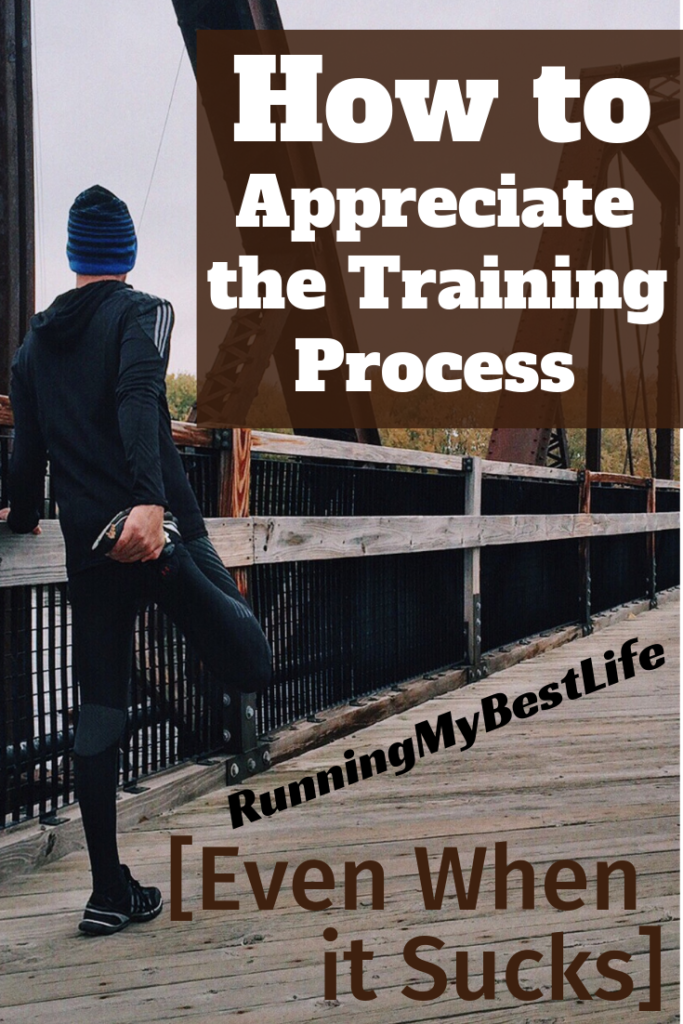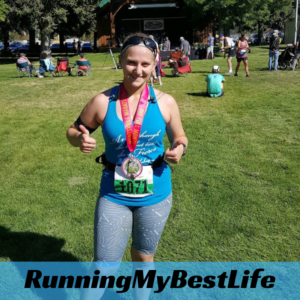
Learning to appreciate the training process can be really tough.
You must learn to trust and appreciate the training process and what it does in developing your body. Your body is stretching its known limits and learning to adapt.
There WILL be days when your body is tired and sore. When you are sore and tired, recognize this for what it is: you are building fitness. You will be better when you attack your next workout after recovery.
Most days, we stretch our limits and need to trust that the training process is designed to do exactly that. Keep going, stick to the plan, and be patient for the results.
Still, we need to listen to our bodies and learn when to keep going, or when we should back off.
How do you know when you need to scale back or take an extra day off?
Trust the process but listen to your body.
Be sure to follow the rest and recovery days in your training plan. Rest days are written into the plan for a reason.
If you really feel exhausted and you just need a day off, take a day off.
It is far better to take an extra rest day and make it to the starting line without injury, than to get injured during training because you didn’t allow your body adequate recovery.

Alternatives to taking an extra day off
Sometimes you don’t actually need to take a whole day off of training.
You could explore some other options that will help in the recovery process and continue increasing your fitness.
- Do the prescribed mileage but slow your pace down by 1-2 minutes per mile. Slowing your pace greatly decreases the stress on your body and allows it to recover better. You might need to slow down to run more miles
- .
Related: 80/20 Running: Why You Need to Slow Down
- Opt for less miles at a slower pace. If you really don’t think you can go out for the prescribed mileage in your training plan that day, then just do a few less miles (and be sure to slow down).
- Switch to a favorite cross training activity for the day. Do something that uses different muscles and will allow your running legs to recover. Whether this is jumping on a bike, swimming, hiking, or strength training, change it up! Sometimes our body just needs something different than the continuous, repetitive motion of running and hitting the pavement.
When Should You Keep Pushing Forward?
This is a fine line that runners are always dancing on. Get your workouts in to train for the distance but avoid pushing it too far if you feel your body telling you to slow down.
Related: 25 Tips to Become a Better Runner
The first time you run a race of a longer distance than your body has done before is a time when you are asking your body to go well beyond its known limits. It WILL scream at you! Doing more is uncomfortable. Nature will always try to make you do less and be more efficient.

If your body is sore, do a check to make sure you are focusing on the proper recovery.
Recovery runs, stretching, cross training, foam rolling, and proper nutrition are all imperative as you run farther.
Understand that the process of increasing fitness involves pushing your body to it’s limits, allowing it to recover and rebuild from the stress and muscle breakage, and then pushing it again. The recovery process is important, and you won’t improve your fitness without it.
If you try to keep pushing your body without allowing recovery, you will break sooner or later. Injury is rampant among runners because most of us would rather keep pushing ourselves farther than take a break.
Be honest with yourself.
Is your body on the edge of breakdown? Or is it trying to avoid hard work?
This question is individual for each runner. I can’t answer it for you, nor can I tell you what the difference feels like. I know what it feels like for my body, but it will be different for your body.
Be in-tune with how you feel. Most common injuries could be prevented if we respected our bodies more and prioritized our long-term health and staying in the race over a short-term goal.
Of course, consult a doctor if you have a history of injury. I’m definitely not a doctor.

Final Thoughts to Appreciate the Training Process
The journey of completing a half marathon or full marathon is really about appreciating the training process. You learn so much in the process such as different types of runs, which running shoes you like the best, how to fuel your body, which foods agree best with you, what your body needs for recovery, and that you are capable of SO MUCH MORE than you think.
I remember one morning distinctly when I was training for my first half marathon.
Early in the morning (I think it was a Wednesday), I drug myself out of bed and went through the motions. I was EXHAUSTED. That specific morning, I was to run 4 or 5 miles.
As I trotted along, slow as can be, tired beyond belief, my body sore as hell, I thought “How on earth am I supposed to run a full 13.1 miles when I have to drag myself through a 5 mile run? 5 miles isn’t even half the distance of the full race, and I’m supposed to run it at an even faster pace than what I’m running right now if I want to hit my goal.”
EVERY. SINGLE. RUNNER. Has had the same exact thought. This is completely normal.
Related: Week 8 Half Marathon Training Diaries
The training process is designed to stress your body and make you adapt.
Some days will be awesome and make you feel on top of the world. Other days will REALLY SUCK and make you wonder why on earth you thought you could do this.
YOU CAN DO THIS! The beauty of training is that it will make you capable of more than you thought possible for yourself.
Just keep going, trust and appreciate the training process, and believe in your ability to do anything you set your mind to.
[convertkit form=878335]
Question: How do you differentiate when your body needs extra rest, or when you should keep pushing through?
Be sure to like my page on Facebook, follow me on Pinterest or Instagram to become part of the community.

Run Happy,
Alexis
- Nailing Your Marathon Hydration Strategy: A Comprehensive Guide
- Conquering Marathons in the Cold: A Comprehensive Guide
- Harnessing the Power of Technology for Successful Marathon Training
- Mastering the Marathon: The Ultimate Guide to Nutrition and Training
- Ultimate Guide to the Top 5 Running Shoes for Beginners in 2023
About Me: I’m Alexis, Founder of RunningMyBestLife! I am an avid recreational runner, half marathoner, wife, dog mom, busy professional, downhill skier in Northern Utah. My mission is to help new enthusiasts fall in love with the sport of running. I believe that running is a catalyst to taking control of your life and living your best life by design. Learn More –>
Some things I already know from my previous experience. For instance, if I work a double shift at work I won’t be able to run the next day. I’m also familiar with my common fatigue spots and more serious indications. So, if my knees are aching badly and appear swollen, I’ll back off running, but, if it’s just some charley horses in my quads, which I get occasionally from hills, I know I can run right through that.
My training plan at this point is very general because my two main goal races are both not until July. So, I can take off most any day I want but I don’t. That’s because running does more for me than just make me able to compete. It gives me a really good feeling that I don’t seem to be able to get any other way- at least any other natural way.